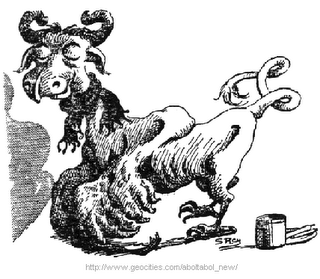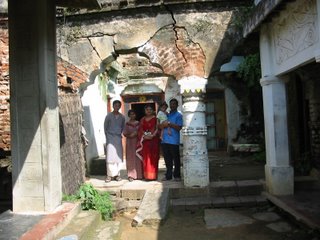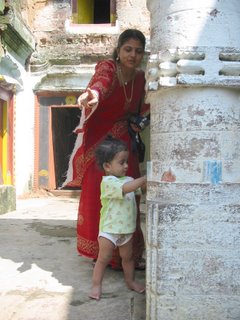Yes, it's in. The word 'adda' in my own native Bengali, has been offcially inducted into the Queen's English. You'll find it listed in the updated Oxford Dictionary.
I love the dynamism of the English language. And I love addas, an untranslatable word meaning, well, you know, groups of like or unlike minded folks in freewheeling intellectual discussions about cabbages and kings. The sort of thing that happpens in writers' groups. I would say even Blogspot, with its galaxy of unique voices, is one gigantic adda.
Other Indian inclusions into English are;
bindaas (Hindi) = carefree
chamcha= toady, flatterer, yes-man
chaddi = underpants
yaar = buddy

Creativity is allowing yourself to make mistakes. Art is knowing which ones to keep. Musings from someone who sees stories everywhere.
Tuesday, August 29, 2006
Saturday, August 26, 2006
A swell surprise
Something astonishing happened. I Googled my name and stumbled upon this
The post went on to say; "Monideepa Sahu (or Moni), always graceful, always kind, is featured at Pindeldyboz with the lovely Mother
Nicer things were in store. References to the San Francisco Bay Area and names of other writers offered no clue until I remembered. Yes, I 'met' Nadine Darling, a talented and accomplished writer, in Zoetrope . We reviewed each others short fiction, swapped friendly Z-mails, and then drifted out of touch. So nice of her to read my published story and remember me.
In a violent and selfish world where those upon whom we shower our affection often turn around to say, 'So what did you ever do for me?', this warmth from someone I have never personally met was amazing.
The post went on to say; "Monideepa Sahu (or Moni), always graceful, always kind, is featured at Pindeldyboz with the lovely Mother
Nicer things were in store. References to the San Francisco Bay Area and names of other writers offered no clue until I remembered. Yes, I 'met' Nadine Darling, a talented and accomplished writer, in Zoetrope . We reviewed each others short fiction, swapped friendly Z-mails, and then drifted out of touch. So nice of her to read my published story and remember me.
In a violent and selfish world where those upon whom we shower our affection often turn around to say, 'So what did you ever do for me?', this warmth from someone I have never personally met was amazing.
Friday, August 25, 2006
Sense in Nonsense
 A friend sent me this picture and it reminded me of many people I've known. It also brought back memories of one of my favourite authors, Sukumar Ray, and his collection of nonsense poems in Bengali, 'Abol Tabol'.
A friend sent me this picture and it reminded me of many people I've known. It also brought back memories of one of my favourite authors, Sukumar Ray, and his collection of nonsense poems in Bengali, 'Abol Tabol'.Haven't we all met people who want everything? Well, all Sukumar Ray's Kimbhut Kimakar ever does is whine. Why can't he have wings and fly like a bird? Wow! Look at the elephant's imposing trunk. He must have one just like it. And if only he had the kangaroo's strong legs and could jump so high. On a cloudy monsoon day, he became everything that he wanted to be without even trying. Now he sits worrying. Can elephants jump up high? Can kangaroos live on banana leaves? What if people laugh at a fat old elephant that jumps and flies and sings like a cuckoo? What if someone asks him straight to his face? What can he call himself? "Oh god!", he groans. "I'm not a horse, elephant, snake or butterfly. I'm neither fish, nor plant, nor water, nor shoe nor umbrella. I am nothing then!"
Sukumar's greatest talent was his unique sense of humour. And it found it's best and most unforgettable expression in his Bengali book 'Abol Tabol' (Rhymes Without Reason). He saw the ordinary, boring world that we live in and found in it the absurd and the ridiculous. He turned the most common things upside-down to make his readers laugh. His humour was free from malice. But he did poke fun at the absurdities of human nature and draw from us a frank roar of laughter.

Meet Tansh Garu, sketched by Sukumar Ray himself to accompany his poems. He isn't a 'garu' or cow at all, but some sort of bird. Sukumar's drawings are as compelling as his words, convincing us that these creatures truly exist.
In Sukumar's topsy-turvy world, The absurd coexists with the commonplace and normal. Tansh Garu lives not in some exotic and distant jungle, but just across the street in friend Haru's office.
 There are humans too, in the world of 'Abol Tabol'. Look at dear old Nanda Uncle, the jolly and adorable elder. Where's his endearing smile? He weeps recounting his visit to the astrologer. He has lived happily for sixty years unaware that he would die. But the astrologer predicted his impending death and ruined Nanda Uncle's peace of mind forever.
There are humans too, in the world of 'Abol Tabol'. Look at dear old Nanda Uncle, the jolly and adorable elder. Where's his endearing smile? He weeps recounting his visit to the astrologer. He has lived happily for sixty years unaware that he would die. But the astrologer predicted his impending death and ruined Nanda Uncle's peace of mind forever.And here's Khudo with his miraculous invention, in another delightful sketch by Sukumar. Khudo's eco-friendly machine will solve the world's transport problems. Fit this machine on the laziest fellow, place his favourite snack where he can see and smell it but can't reach it, and you have the most efficient motivator. This machine will help a man run for miles without tiring or complaining.
In Sukumar Ray's works, the spirit of whimsical fun is masked by an apparent sophisticated seriousness. A hundred and nineteen years after his birth, his writing continues to evoke smiles and chuckles.
Sunday, August 20, 2006
writer's quest continues
Zafar, Deepika and Atyllah, thanks for visiting. I'm making this as a post and not a reply to your comments for the benefit of anyone else who chances to drop by and discover that we are in soups of similar viscosity. I don't know why I posted that earlier one, perhaps for people who keep asking why I dont publish my stories etc as books. I know even members of the relatively serious Indian writers' groups think it's a cinch to get works of fiction published and become rich and famous. Perhaps the 'success' of writers like Kavya Vishwanathan fuel their high hopes.
Selling an article on say, mehendi parties and wedding dresses to a foreign magazine is much, much easier than selling a short story collection or novel. And it's very lucrative. Agents/publishers don't have time for anything but polite 'form rejctions' for works of fiction they they don't want to represent. Those of us who frequent writers' groups have a pretty good picture of what those bland little 'thanks, but no thanks' slips really mean.
But what really raises hope and then makes the writer's heart plummet into the ravines of the Himalayas, is that 'encouraging rejection'. It often happens that an agent or editor likes your work enough to meet you personally and spend her valuable time discussing other ideas. They offer detailed and positive comments on your work and suggestions for changes which you may not agree with. They also offer to see more work from you.
But such 'encouraging rejections', though fewer and perhaps more esoterically valuable for the poor wannabe seeking publication, also can result in nothing.
I keep these rare ones in separate files. works nearly as well chocolates to lift a dismal mood. Here's an exerpt from one I got from an agent in New York;
Dear Monideepa,
I just finished reading your manuscript, and while I like your characters and the story's premise (a spider and rat transform into humans to help a family fight off an evil moneylender), I felt the story was too complex for your audience (ages 9-12 or maybe younger?). I liked the worlds of the story, but I found the treasure hunt difficult to follow and unnecessary: even though the rats needed gold to pay off the moneylender, in the end they got rid of him another way. The most interesting moments in the story are the relationships between the insects, rats and kids and the secret animal/insect worlds (original and fun).
When you're ready to write a new novel, you might like to look up some of the animal/insect novels on BN.com. Here's one search. If the link doesn't work, I gave you steps on how to get there.
Here you'll find synopses of featured titles in the trade market, sorted by publisher. You should be able to get a sense of the types of books they publish and where your writing fits in the marketplace. A follow-up visit to publishers’ web sites will yield further insights and lead to a new kind of focus in your writing—more to a publisher’s way of thinking.
Monideepa, thanks again for giving me an opportunity to read your novel--I enjoyed it and hope to read more of your work in the future.
Sincerely,
Debbie
****
As the PenguinIndia editor told me, and as Debbie the agent stresses at the end of her note to me, market forces play a big role in selecting works for publication. I subsequently learnt from other children's fantasy writers that, since there are already a spate of successful books in this genre in the market, publishers/agents aren't keen on trying out works from new writers at the moment.
Right timing and good marketing strategies matter. Nearly as much as polishing your writing to make it the best it can be.
Selling an article on say, mehendi parties and wedding dresses to a foreign magazine is much, much easier than selling a short story collection or novel. And it's very lucrative. Agents/publishers don't have time for anything but polite 'form rejctions' for works of fiction they they don't want to represent. Those of us who frequent writers' groups have a pretty good picture of what those bland little 'thanks, but no thanks' slips really mean.
But what really raises hope and then makes the writer's heart plummet into the ravines of the Himalayas, is that 'encouraging rejection'. It often happens that an agent or editor likes your work enough to meet you personally and spend her valuable time discussing other ideas. They offer detailed and positive comments on your work and suggestions for changes which you may not agree with. They also offer to see more work from you.
But such 'encouraging rejections', though fewer and perhaps more esoterically valuable for the poor wannabe seeking publication, also can result in nothing.
I keep these rare ones in separate files. works nearly as well chocolates to lift a dismal mood. Here's an exerpt from one I got from an agent in New York;
Dear Monideepa,
I just finished reading your manuscript, and while I like your characters and the story's premise (a spider and rat transform into humans to help a family fight off an evil moneylender), I felt the story was too complex for your audience (ages 9-12 or maybe younger?). I liked the worlds of the story, but I found the treasure hunt difficult to follow and unnecessary: even though the rats needed gold to pay off the moneylender, in the end they got rid of him another way. The most interesting moments in the story are the relationships between the insects, rats and kids and the secret animal/insect worlds (original and fun).
When you're ready to write a new novel, you might like to look up some of the animal/insect novels on BN.com. Here's one search. If the link doesn't work, I gave you steps on how to get there.
Here you'll find synopses of featured titles in the trade market, sorted by publisher. You should be able to get a sense of the types of books they publish and where your writing fits in the marketplace. A follow-up visit to publishers’ web sites will yield further insights and lead to a new kind of focus in your writing—more to a publisher’s way of thinking.
Monideepa, thanks again for giving me an opportunity to read your novel--I enjoyed it and hope to read more of your work in the future.
Sincerely,
Debbie
****
As the PenguinIndia editor told me, and as Debbie the agent stresses at the end of her note to me, market forces play a big role in selecting works for publication. I subsequently learnt from other children's fantasy writers that, since there are already a spate of successful books in this genre in the market, publishers/agents aren't keen on trying out works from new writers at the moment.
Right timing and good marketing strategies matter. Nearly as much as polishing your writing to make it the best it can be.
Saturday, August 19, 2006
Independence Day and Janmashtami
August 15th was Independence Day, an independence which means different things to diverse people. As usual, I saw stories in news reports and in ordinary things happening around me.
An Englishman living in Bangalore wrote a letter to the editor. He felt that development and prosperity meant a lot more than an outcrop of swanky malls and high-rises. I totally agree. Everyone and their envious neighbours are buying bigger and more fuel guzzling and exhaust belching cars. People jostling for limited road space, everyone in a hurry to elbow others out of their way, road rage. They push unfortunate pedestrians into the spaces between gutters and construction material heaped on what used to be pavements. All, perhaps, for the freedom to acquire more, more, more.
On 16, we celebrated Janmashtami, the birth of Lord Krishna. A friend saw a stream of complicated and critical cases pouring into their hospital's labour wards; high risk cases which were beyond the capacity of smaller nursing homes and health centers. The friend returned home a bit past dinner time, exhausted but jubilant. In such difficult cases, it is not uncommon for the babies to die along with their mothers despite doctors' best efforts.
But on Janmashtami day, all of them survived and are on their way to complete recovery. For us this was the best celebration.
An Englishman living in Bangalore wrote a letter to the editor. He felt that development and prosperity meant a lot more than an outcrop of swanky malls and high-rises. I totally agree. Everyone and their envious neighbours are buying bigger and more fuel guzzling and exhaust belching cars. People jostling for limited road space, everyone in a hurry to elbow others out of their way, road rage. They push unfortunate pedestrians into the spaces between gutters and construction material heaped on what used to be pavements. All, perhaps, for the freedom to acquire more, more, more.
On 16, we celebrated Janmashtami, the birth of Lord Krishna. A friend saw a stream of complicated and critical cases pouring into their hospital's labour wards; high risk cases which were beyond the capacity of smaller nursing homes and health centers. The friend returned home a bit past dinner time, exhausted but jubilant. In such difficult cases, it is not uncommon for the babies to die along with their mothers despite doctors' best efforts.
But on Janmashtami day, all of them survived and are on their way to complete recovery. For us this was the best celebration.
Saturday, August 12, 2006
What writers want
Mountain ranges and canyons seem to divide what writers want from the priorities of an editor or publisher. Some years ago, one of the senior editors at Deccan Herald gave me an intro to a Penguin editor. I emailed her and sent a sample of my childrens writing as requested. And then she suggested we meet.
She was very polite and businesslike, particulalrly liked one of my ideas, and I went ahead and wrote a novel. She saw it, said nice things, and I felt on top of the world, dreaming BIG dreams.
but...It wasn't good enough fo them to buy the book. She explained privately that promoting new writers was extremely tricky. I got the distinct hint that especially if a writer wasn't into the arty party circuits and knew everyone who matters, people will wonder who the heck is this and not take interest in a nobody. If a writer is already well-known, it is that much easier to proftably sell his books. Bottom line: marketing and profits count. Unless a new writer can make a particular editor fall in love with his work, it won't get published. A very iffy business on the whole. Unknown writers like me are poor business propositions.
privately that promoting new writers was extremely tricky. I got the distinct hint that especially if a writer wasn't into the arty party circuits and knew everyone who matters, people will wonder who the heck is this and not take interest in a nobody. If a writer is already well-known, it is that much easier to proftably sell his books. Bottom line: marketing and profits count. Unless a new writer can make a particular editor fall in love with his work, it won't get published. A very iffy business on the whole. Unknown writers like me are poor business propositions.
To me it seemed like the chicken or egg conundrum.
She did like my work enough to try to put me on to translating childrens stories, and I worked on some of her sugestions. But nothing came of it. Basically, all publishers look at the business side and after much writing and discussing, no deal may come through.
At this stage, I decided to stop writing things to 'fit in' to the needs of publishers. Now, I write about what I feel like, where my heart leads me. Not expecting to make megabucks or waiting for the biggies to come flying with gilt edged contracts to my doorstep. Not because I don't need money. We're simple middle class folks. But I feel I've slogged in the rat race long enough, so I deserve a bit of personal freedom. So if an editor/publisher likes it, fine. If he doesn't, I never expected anyone to.
I know many talented but unknown writers who are nothing of consequence. As yet.
unknown writers who are nothing of consequence. As yet.
I feel everyone starts at that point. Luck and hard work determine where they go from there
This is where I am right now, refining my writing to make it the best it can be and searching for an audience. The story continues.
She was very polite and businesslike, particulalrly liked one of my ideas, and I went ahead and wrote a novel. She saw it, said nice things, and I felt on top of the world, dreaming BIG dreams.
but...It wasn't good enough fo them to buy the book. She explained
 privately that promoting new writers was extremely tricky. I got the distinct hint that especially if a writer wasn't into the arty party circuits and knew everyone who matters, people will wonder who the heck is this and not take interest in a nobody. If a writer is already well-known, it is that much easier to proftably sell his books. Bottom line: marketing and profits count. Unless a new writer can make a particular editor fall in love with his work, it won't get published. A very iffy business on the whole. Unknown writers like me are poor business propositions.
privately that promoting new writers was extremely tricky. I got the distinct hint that especially if a writer wasn't into the arty party circuits and knew everyone who matters, people will wonder who the heck is this and not take interest in a nobody. If a writer is already well-known, it is that much easier to proftably sell his books. Bottom line: marketing and profits count. Unless a new writer can make a particular editor fall in love with his work, it won't get published. A very iffy business on the whole. Unknown writers like me are poor business propositions.To me it seemed like the chicken or egg conundrum.
She did like my work enough to try to put me on to translating childrens stories, and I worked on some of her sugestions. But nothing came of it. Basically, all publishers look at the business side and after much writing and discussing, no deal may come through.
At this stage, I decided to stop writing things to 'fit in' to the needs of publishers. Now, I write about what I feel like, where my heart leads me. Not expecting to make megabucks or waiting for the biggies to come flying with gilt edged contracts to my doorstep. Not because I don't need money. We're simple middle class folks. But I feel I've slogged in the rat race long enough, so I deserve a bit of personal freedom. So if an editor/publisher likes it, fine. If he doesn't, I never expected anyone to.
I know many talented but
 unknown writers who are nothing of consequence. As yet.
unknown writers who are nothing of consequence. As yet.I feel everyone starts at that point. Luck and hard work determine where they go from there
This is where I am right now, refining my writing to make it the best it can be and searching for an audience. The story continues.
Wednesday, August 09, 2006
A Gandhian Passes
A couple of days ago, the newspapers announced the passing of Mahadevi Tayi, a veteran freedom fighter. This venerable nonagenarian was a child widow and a disciple of Mahatma Gandhi. I had the opportunity to interact with her some years ago. Here's an account.
Tucked away in a quiet, tree-lined lane in Bangalore's Kumara Park, is a spacious compound with many large trees. Inside, there are some simple cottages recreating a typical a village setting. This is a home for the aged and orphans. Upon entering, I was greeted by a fair, aged lady wearing a white sari, conversing with a younger lady in saffron. "Was this ashram really blessed by Acharya Vinobha Bhave?" I asked, pointing to a plaque.
"Oh yes. I was his sevika, and a freedom fighter", said Mahadevi Tayi, the lady in white. "See, there's my photograph on the wall, along with Acharya Vinobhaji, and Pandit Nehru."
"It's all like a story now. I was young and full of energy. Now I'm ninety-four,"Mahadevi Tayi continued. "Those were heady days. Every heart was filled with idealism and patriotic feelings. Gandhiji was a great leader, who called everyone to do non-violent satyagraha against oppressive British rule. I grew up in Wardha under his influence. The young and old, women and children all enthusiastically joined the Freedom Movement.
"At first, the women were shy, but they gained confidence to do satyagraha. Many women were imprisoned along with their husbands. Their property was confiscated by the British, leaving the children destitute. I ran an ashram for three hundred such children, hiding my work from the British government. I was jailed for this, and on three other occasions as well. I even underwent rigorous imprisonment with criminals, and solitary confinement. But we had the courage to withstand hardship, and sacrifice our personal comfort for the sake of our country.
During the Razakar Andolan in the princely state of Hyderabad, Vinobhaji was called. Vinobhaji went on a padyatra in rural areas for fourteen years. Many men and women from all parts of the country followed him. I was constantly by his side. Vinobhaji saw wide disparities among the rich, landed people, and the poor, landless peasants. Vinobhaji asked the rich to donate land for distribution among the poor. This was the Bhoodan Movement."
Channamma Hallikere, the lady in saffron, had her own story to tell. "As freedom fighters, my parents were imprisoned many times. As a one-year old baby, I stayed in Dhulia jail with my mother. When my parents were jailed, the British confiscated our property. I now live in Vinobhaji's ashram in Wardha. He started this ashram for uniting women workers. It is a community of women, including foreigners, living together in cooperation and harmony as brahmacharis. I conduct three-day camps for people in rural areas, helping them and spreading the teachings of Gandhiji and Vinobhaji in Kannada. I have been doing social work for fifty years."
"Helping and encouraging the people in the ashram keeps me busy", said Mahadevi Tayi. "Nobody is destitute or anath. God is everyone's nath."
Tucked away in a quiet, tree-lined lane in Bangalore's Kumara Park, is a spacious compound with many large trees. Inside, there are some simple cottages recreating a typical a village setting. This is a home for the aged and orphans. Upon entering, I was greeted by a fair, aged lady wearing a white sari, conversing with a younger lady in saffron. "Was this ashram really blessed by Acharya Vinobha Bhave?" I asked, pointing to a plaque.
"Oh yes. I was his sevika, and a freedom fighter", said Mahadevi Tayi, the lady in white. "See, there's my photograph on the wall, along with Acharya Vinobhaji, and Pandit Nehru."
"It's all like a story now. I was young and full of energy. Now I'm ninety-four,"Mahadevi Tayi continued. "Those were heady days. Every heart was filled with idealism and patriotic feelings. Gandhiji was a great leader, who called everyone to do non-violent satyagraha against oppressive British rule. I grew up in Wardha under his influence. The young and old, women and children all enthusiastically joined the Freedom Movement.
"At first, the women were shy, but they gained confidence to do satyagraha. Many women were imprisoned along with their husbands. Their property was confiscated by the British, leaving the children destitute. I ran an ashram for three hundred such children, hiding my work from the British government. I was jailed for this, and on three other occasions as well. I even underwent rigorous imprisonment with criminals, and solitary confinement. But we had the courage to withstand hardship, and sacrifice our personal comfort for the sake of our country.
During the Razakar Andolan in the princely state of Hyderabad, Vinobhaji was called. Vinobhaji went on a padyatra in rural areas for fourteen years. Many men and women from all parts of the country followed him. I was constantly by his side. Vinobhaji saw wide disparities among the rich, landed people, and the poor, landless peasants. Vinobhaji asked the rich to donate land for distribution among the poor. This was the Bhoodan Movement."
Channamma Hallikere, the lady in saffron, had her own story to tell. "As freedom fighters, my parents were imprisoned many times. As a one-year old baby, I stayed in Dhulia jail with my mother. When my parents were jailed, the British confiscated our property. I now live in Vinobhaji's ashram in Wardha. He started this ashram for uniting women workers. It is a community of women, including foreigners, living together in cooperation and harmony as brahmacharis. I conduct three-day camps for people in rural areas, helping them and spreading the teachings of Gandhiji and Vinobhaji in Kannada. I have been doing social work for fifty years."
"Helping and encouraging the people in the ashram keeps me busy", said Mahadevi Tayi. "Nobody is destitute or anath. God is everyone's nath."
Wednesday, August 02, 2006
Burichang and Kudutai
 Long ago and far away, my forefathers had a homeland; a sylvan paradise which they left forever after India was partitioned. My elders told dreamy stories about a lost Arcadia of milk, honey and communal amity. That home was a village called Burichang.
Long ago and far away, my forefathers had a homeland; a sylvan paradise which they left forever after India was partitioned. My elders told dreamy stories about a lost Arcadia of milk, honey and communal amity. That home was a village called Burichang.Burichang has grown into a sub-divisional town in Comilla District now, in a foriegn country named Bangladesh. My uncle visited there recently and told us how the family home now houses governement offices and a school.
Born in free India, growing up in capital cities like New Delhi and Washington D.C., I listened with incredulity to what seemed like fairy tales of a lost Eden. I never lived in a real Indian village, never visited one until I did my rural and agricultural banking postings as a probationary officer with the State Bank of India group.

I finally inherited a genuine rural address by marriage, village Kudutai, dist Ganjam, Orissa. The emerald paddy fields and groves of cashew trees with luscious red cashew apples, the undulating hills, yes, this is a paradise on earth.
The now crumbling ancestral mansion still displays signs of old grandeur in the massive decorated pillars and ornamental doorways. These were once scenes of community festivities, of village panchayats and dispensation of justice.
The old mansion now lies abandoned, like the beached body of a magnificent whale.
 Descendants of the clan live in featureless matchbox quarters with modern amenities huddled behind the grand facade of the original house.
Descendants of the clan live in featureless matchbox quarters with modern amenities huddled behind the grand facade of the original house.Seeing the beauty of Kudutai, I now understand what my own parents and elders still mourn. I also see that it is no unspoilt paradise. Kudutai is an ordinary village in a remote corner of a less developed state of India. Electricity came here only at the fag end of the twentieth century. A few months ago, a young cousin died of cerebral malaria. There are no doctors or hospitals in the village.
The younger generation of the family are now entering into service oriented professions. Idealism can also motivate.
Tuesday, August 01, 2006
Exchanging critiques and Igniting friendships
I've learnt a lot over the years workshopping my stories in Zoetrope Studios and the IWW. In the course of exchanging critiques and writing tips, I've found a few special friends . We've never met in person, but that has never been a barrier. Some of them are like family now, and I'm fortunate to have them around. Announce a new publication, and workshop members cheer you on. Air your frustrations when those rejection notes pile up, and friends motivate you to never give up.
Sometimes friends return after a long absence to share disconcerting news. I felt so sad when Deepa wrote in to say;
"our home along with all other buildings in our area for a 20 km stretch -- homes, shops, hospital, schools, temples, bank, industries, etc. is going to be demolished in 2007 as the govt. has decided they want to expand the highway! This would displace over 100,000 people and render at least another 100, 000 unemployed apart from breaking up families as some have to stay on in the area due to the jobs while others have to move.
And there are moments of pure fun like when Beth returned up after years, now as the happy mother of a baby girl. We plunged into a critique exchange and a heated discussion on a shared passion for hot chilies. We use a lot of the stuff , call them chilies or mirchi in Hindi. In my own mother tongue, Bengali, they're called 'lanka', not as in Sri Lanka, but well...A Chili by any other name is just as fiery.
Beth tells me about her home, New Mexico, "where chile is not just a food, it's a way of life... When Green Chile Season rolls around (September usually), everyone buys their big bushel sacks full of chile and spends an afternoon roasting them on the grill, drinking beer, and eating bits of roasted green chile rolled in tortillas. The smell is amazing and the whole harvesting season is something everyone looks forward to all year long.
In New Mexico, "chili" refers to the stew-like concoction of beef, beans, onions, spices, etc.
More than you ever wanted to know about New Mexico chile! Can you tell I'm passionate about it? "
This is how we share stories, and discover newer ones.
Sometimes friends return after a long absence to share disconcerting news. I felt so sad when Deepa wrote in to say;
"our home along with all other buildings in our area for a 20 km stretch -- homes, shops, hospital, schools, temples, bank, industries, etc. is going to be demolished in 2007 as the govt. has decided they want to expand the highway! This would displace over 100,000 people and render at least another 100, 000 unemployed apart from breaking up families as some have to stay on in the area due to the jobs while others have to move.
And there are moments of pure fun like when Beth returned up after years, now as the happy mother of a baby girl. We plunged into a critique exchange and a heated discussion on a shared passion for hot chilies. We use a lot of the stuff , call them chilies or mirchi in Hindi. In my own mother tongue, Bengali, they're called 'lanka', not as in Sri Lanka, but well...A Chili by any other name is just as fiery.
Beth tells me about her home, New Mexico, "where chile is not just a food, it's a way of life... When Green Chile Season rolls around (September usually), everyone buys their big bushel sacks full of chile and spends an afternoon roasting them on the grill, drinking beer, and eating bits of roasted green chile rolled in tortillas. The smell is amazing and the whole harvesting season is something everyone looks forward to all year long.
In New Mexico, "chili" refers to the stew-like concoction of beef, beans, onions, spices, etc.
More than you ever wanted to know about New Mexico chile! Can you tell I'm passionate about it? "
This is how we share stories, and discover newer ones.
Subscribe to:
Comments (Atom)